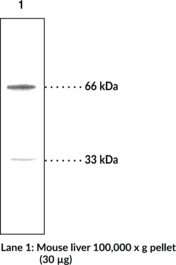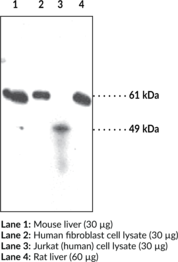Description
PTEN-induced putative kinase 1 (PINK1) is a serine/threonine protein kinase that has a role in mitochondrial function.{54198,54199} It is comprised of an N-terminal mitochondrial targeting sequence, a transmembrane domain, a serine/threonine kinase domain, and a C-terminal region.{54199} PINK1 is ubiquitously expressed primarily in the brain, skeletal muscle, and heart.{54200} It localizes to the mitochondria where it is either rapidly degraded or, under conditions of low mitochondrial membrane potential, accumulates on the outer mitochondrial membrane, where it recruits and activates the cytosolic E3 ubiquitin ligase Parkin, which targets the mitochondria for mitophagy.{54200,54198} Pink1 knockout in rats leads to an age-dependent loss of dopaminergic neurons in the substantia nigra, as well as deficits in motor function and mitochondrial respiration.{54201} In mice, Pink1 knockout does not induce a loss of dopaminergic neurons without concomitant overexpression of α-synuclein in the substantia nigra.{54202} Loss-of-function mutations in PINK1 are causally associated with autosomal recessive early-onset Parkinson’s disease.{54200,12321} Cayman’s PINK1 Polyclonal Antibody can be used for immunohistochemistry (IHC) and Western blot (WB) applications. The antibody primarily recognizes full-length PINK1 at approximately 66 kDa from human, mouse, and rat samples but also detects a truncated form of the protein at approximately 33 kDa.
Synonyms: BRPK|PARK6|PTEN Induced Putative Kinase 1|PTEN Inducible Kinase 1|Serine/Threonine-protein Kinase PINK1
Immunogen: Synthetic peptide from the C-terminal region of human PINK1
Formulation: 500 μl of Peptide affinity-purified antibody
Isotype:
Applications: IHC, WB
Origin: Animal/Rabbit
Stability: 365 days
Application|Immunohistochemistry||Application|Western Blot||Product Type|Antibodies|Polyclonal Antibodies||Research Area|Cardiovascular System|Heart||Research Area|Cell Biology|Cell Signaling||Research Area|Cell Biology|Mitochondrial Biology||Research Area|Cell Biology|Proteolysis|Ubiquitin/Proteasome System||Research Area|Neuroscience|Neurodegenerative Disorders|Parkinson’s Disease


